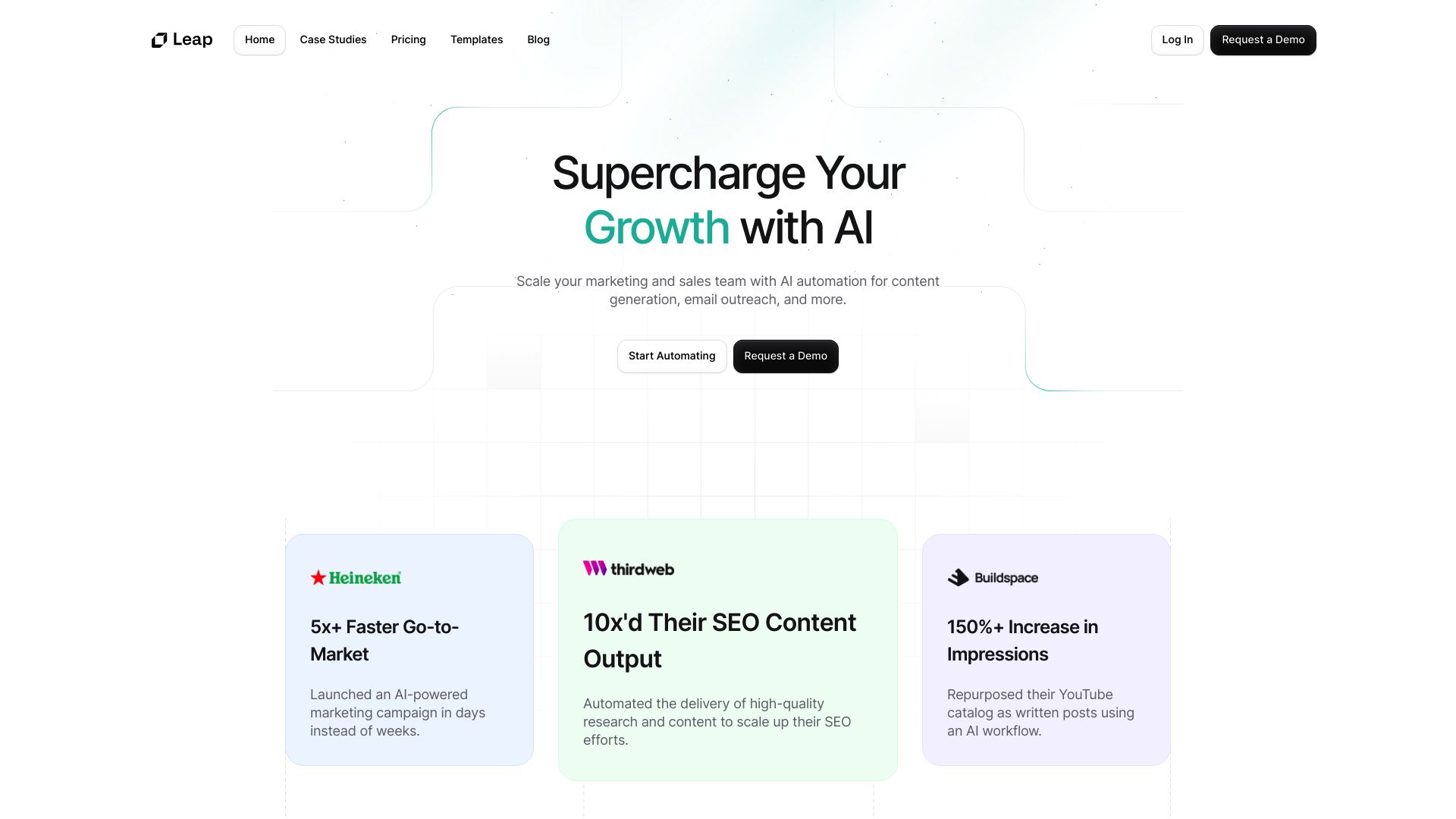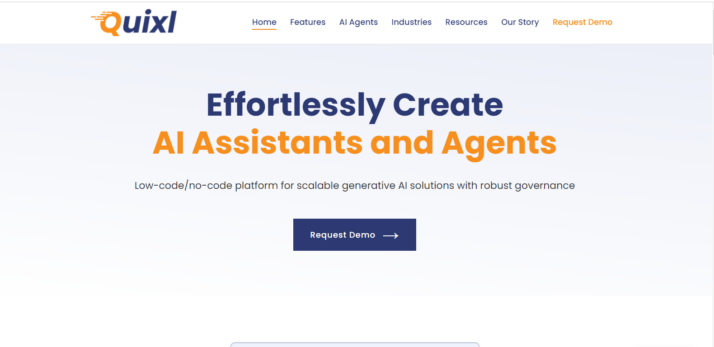Leap AI vs. Quixl AI: Comparing Core Features and Capabilities
AI-powered platforms revolutionize business processes, promising enhanced efficiency and innovation. Our comprehensive review compares Leap AI vs. Quixl AI, and SmythOS, dissecting their core features, integration capabilities, and industry-specific solutions. We evaluate each platform’s strengths in no-code development, AI model support, and deployment flexibility. For developers seeking robust APIs, business leaders prioritizing scalability, or professionals exploring user-friendly AI tools, this analysis offers crucial insights to inform your AI strategy. Discover how these platforms stack up in real-world applications and which solution best aligns with your organization’s unique needs and technical requirements.
Leap AI Overview
Leap AI empowers users to create sophisticated AI workflows without coding expertise. This platform integrates multiple AI models, including OpenAI GPT and Stable Diffusion XL, to enable a wide range of applications from text generation to image creation.
Leap AI’s no-code approach centers on a drag-and-drop interface, allowing users to build complex AI-powered applications within minutes. The platform offers extensive SDK support, including RESTful API, TypeScript, and Python, facilitating seamless integration into various development environments.
Leap AI empowers users to create sophisticated AI workflows without coding expertise. This platform integrates multiple AI models… to enable a wide range of applications from text generation to image creation.
Leap AI provides a rich template library, accelerating the creation of AI applications for tasks like blog post generation, music creation, and lead summarization. These pre-built templates significantly reduce development time for common use cases.


The platform’s integration capabilities extend to popular tools like Slack, Hubspot, Zendesk, and Zapier, enhancing its utility across diverse business ecosystems. Users can design and execute workflows directly from the dashboard, streamlining the development process.
Leap AI’s AI model training feature allows users to fine-tune and train custom models using their own datasets. This capability enhances the specificity and accuracy of AI outputs, tailoring solutions to unique business needs.
While Leap AI offers robust features for AI workflow creation, it lacks some advanced capabilities found in other platforms. The absence of hosted agents for separate development and production environments may limit deployment flexibility for some users. Additionally, the platform does not support autonomous agents or provide extensive debugging tools, which could impact complex AI application development.
Quixl AI Overview
Quixl AI, developed by Integra, offers a comprehensive platform for AI technology adoption across industries. The platform features a no-code AI agent builder, leveraging generative AI and large language models to streamline automation and boost productivity. Quixl AI stands out with its AI Agents Hub, providing pre-built agents for quick deployment, and a Prompt Studio for advanced customization.


Quixl AI, developed by Integra, offers a comprehensive platform for AI technology adoption across industries. The platform features a no-code AI agent builder, leveraging generative AI and large language models…
The platform excels in supporting seamless AI integration, rapid deployment, and scalable growth. It caters to diverse business needs, from alt-text generation and manuscript assessment to enterprise knowledge search and content editing. Quixl AI offers tailored solutions for specific industries like Media and Entertainment, Publishing and EdTech, and Healthcare, enhancing user engagement, personalizing learning experiences, and automating administrative tasks.
Quixl AI represents the culmination of Integra’s extensive research and commitment to innovation. It provides a unified, scalable, and secure AI ecosystem that facilitates AI monetization and offers a robust API Gateway. The platform ensures data security with advanced transfer mechanisms and supports both on-premises and cloud deployments, making advanced AI accessible to businesses of all sizes.
While Quixl AI offers a range of powerful features, it does have some limitations. The platform lacks hosted agents for development and production environments, which may impact workflow flexibility. Additionally, Quixl AI does not support autonomous agents or provide explainability and transparency features, which could be crucial for certain applications requiring detailed insights into AI decision-making processes.
Quixl AI integrates well with various tools and systems, supporting multimodal interactions and offering problem-solving capabilities through its AI-driven text analysis and categorization features. However, it falls short in areas like multi-agent collaboration and constrained alignment, which might limit its applicability in complex, multi-faceted AI projects.
In the competitive landscape, Quixl AI positions itself as a versatile solution for businesses looking to leverage AI without extensive coding knowledge. Its strengths lie in its no-code approach, industry-specific solutions, and integration capabilities. However, users requiring more advanced features like autonomous agents or detailed explainability might find the platform somewhat limiting compared to more specialized alternatives.
Feature Comparison
Leap AI and Quixl AI offer distinct approaches to AI agent development, with some key differences in their feature sets. Leap AI provides a user-friendly no-code platform for creating AI workflows, integrating multiple AI models like OpenAI GPT and Stable Diffusion XL. It excels in offering extensive SDK support and a rich template library, accelerating development for common use cases. Quixl AI, developed by Integra, focuses on industry-specific solutions and seamless AI integration, featuring a no-code AI agent builder and an AI Agents Hub with pre-built agents.
A significant gap between the two platforms lies in their core components. Leap AI lacks hosted agents for separate development and production environments, potentially limiting deployment flexibility. Quixl AI, on the other hand, offers tailored solutions for specific industries like Media and Entertainment and Healthcare, but does not provide autonomous agent capabilities or detailed explainability features. This difference impacts users requiring more advanced AI functionalities or those needing clear insights into AI decision-making processes.
In terms of security, both platforms implement data encryption measures. However, Quixl AI emphasizes its unified, scalable, and secure AI ecosystem, supporting both on-premises and cloud deployments. This robust security framework may give Quixl AI an edge for enterprises with stringent data protection requirements. Leap AI, while offering multi-layer encryption, does not explicitly mention features like constrained alignment or extensive debugging tools, which could be crucial for complex AI application development in sensitive industries.
Feature Comparison Table
| Leap AI | Quixl AI | SmythOS | |
|---|---|---|---|
| CORE FEATURES | |||
| Hosted Agents (Dev, Production) | ❌ | ✅ | ✅ |
| Autonomous Agents | ❌ | ✅ | ✅ |
| Explainability & Transparency | ❌ | ✅ | ✅ |
| Debug Tools | ❌ | ✅ | ✅ |
| Multi-Agent Collaboration | ❌ | ✅ | ✅ |
| SECURITY | |||
| Constrained Alignment | ❌ | ✅ | ✅ |
| COMPONENTS | |||
| Data Lakes | ❌ | ✅ | ✅ |
| DEPLOYMENT OPTIONS (EMBODIMENTS) | |||
| DATA LAKE SUPPORT | |||
| Hosted Vector Database | ❌ | ✅ | ✅ |
| Sitemap Crawler | ✅ | ❌ | ✅ |
| YouTube Transcript Crawler | ✅ | ❌ | ✅ |
| URL Crawler | ✅ | ❌ | ✅ |
Best Alternative to Leap AI and Quixl AI
SmythOS stands out as the superior alternative to Leap AI and Quixl AI, offering a comprehensive platform for AI agent development and deployment. We’ve designed SmythOS to address the limitations of other platforms while providing unparalleled flexibility and power.
Our drag-and-drop interface simplifies the creation of complex AI workflows, making advanced AI development accessible to users with varying levels of technical expertise. Unlike Leap AI’s limited deployment options, SmythOS supports a wide range of deployment scenarios, including APIs, webhooks, scheduled agents, and chatbots. This versatility ensures that our platform can adapt to diverse business needs and use cases.
SmythOS excels in areas where Quixl AI falls short, particularly in autonomous agent capabilities and multi-agent collaboration. Our platform enables the creation of truly autonomous AI agents that can operate independently and work together on complex tasks. This feature set opens up possibilities for sophisticated AI applications that go beyond what Leap AI or Quixl AI can offer.
SmythOS excels in areas where Quixl AI falls short, particularly in autonomous agent capabilities and multi-agent collaboration.
We’ve also prioritized explainability and transparency in AI decision-making, addressing a critical gap in many AI platforms. Our debug tools and comprehensive logging capabilities provide insights into agent behavior, fostering trust and enabling continuous improvement. This level of transparency is essential for businesses that require accountability in their AI systems, especially in regulated industries.
SmythOS’s robust security features, including constrained alignment and advanced encryption, ensure that AI agents operate within defined parameters and handle sensitive data securely. Our platform’s scalability and support for both cloud and on-premises deployments make it suitable for businesses of all sizes, from startups to large enterprises. With SmythOS, we’re not just offering a tool – we’re providing a complete ecosystem for AI innovation that surpasses the capabilities of both Leap AI and Quixl AI.
Conclusion
Leap AI and Quixl AI offer compelling solutions for AI integration, but SmythOS emerges as the superior choice for businesses seeking comprehensive AI capabilities. While Leap AI excels in no-code workflow creation and Quixl AI focuses on industry-specific solutions, SmythOS combines the best of both worlds and adds unparalleled versatility.
SmythOS stands out with its extensive feature set, including hosted agents for development and production, a visual builder, and support for autonomous agents. These capabilities address limitations found in both Leap AI and Quixl AI, providing a more robust platform for complex AI projects. SmythOS’s emphasis on explainability, debugging, and multi-agent collaboration offers the transparency and flexibility that modern AI applications demand.
Unlike its competitors, SmythOS offers a true ’create once, deploy anywhere’ approach, allowing users to seamlessly integrate AI agents across various platforms and services. This versatility, combined with SmythOS’s extensive integration ecosystem of over 300,000 connections, positions it as the ideal choice for businesses looking to maximize their AI potential.
For those ready to experience the future of AI automation, we invite you to explore SmythOS’s diverse range of AI-powered agent templates and create a free SmythOS account to start building unlimited AI agents at no cost. With SmythOS, you’ll unlock unparalleled AI capabilities and transform your business processes, all backed by our 30-day money-back guarantee. Dive into our comprehensive documentation to discover how SmythOS can elevate your AI strategy and drive innovation across your organization.
Last updated:
Disclaimer: The information presented in this article is for general informational purposes only and is provided as is. While we strive to keep the content up-to-date and accurate, we make no representations or warranties of any kind, express or implied, about the completeness, accuracy, reliability, suitability, or availability of the information contained in this article.
Any reliance you place on such information is strictly at your own risk. We reserve the right to make additions, deletions, or modifications to the contents of this article at any time without prior notice.
In no event will we be liable for any loss or damage including without limitation, indirect or consequential loss or damage, or any loss or damage whatsoever arising from loss of data, profits, or any other loss not specified herein arising out of, or in connection with, the use of this article.
Despite our best efforts, this article may contain oversights, errors, or omissions. If you notice any inaccuracies or have concerns about the content, please report them through our content feedback form. Your input helps us maintain the quality and reliability of our information.
